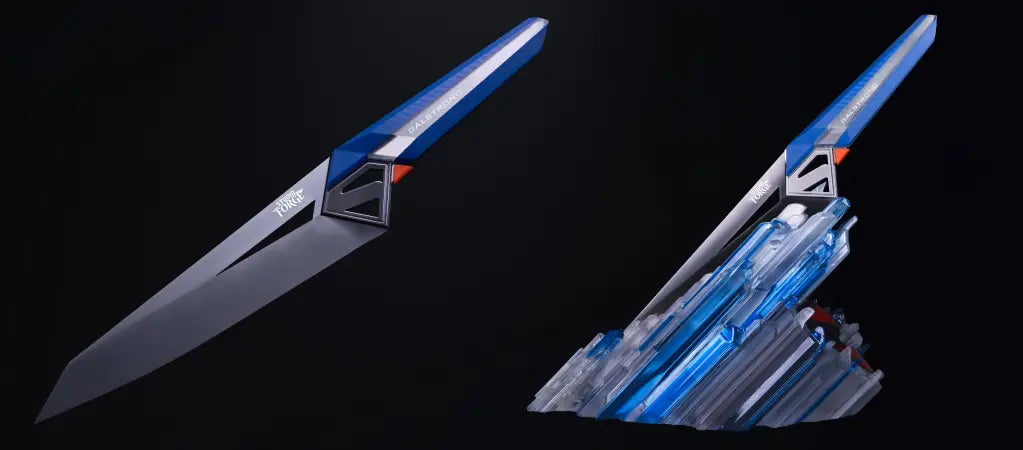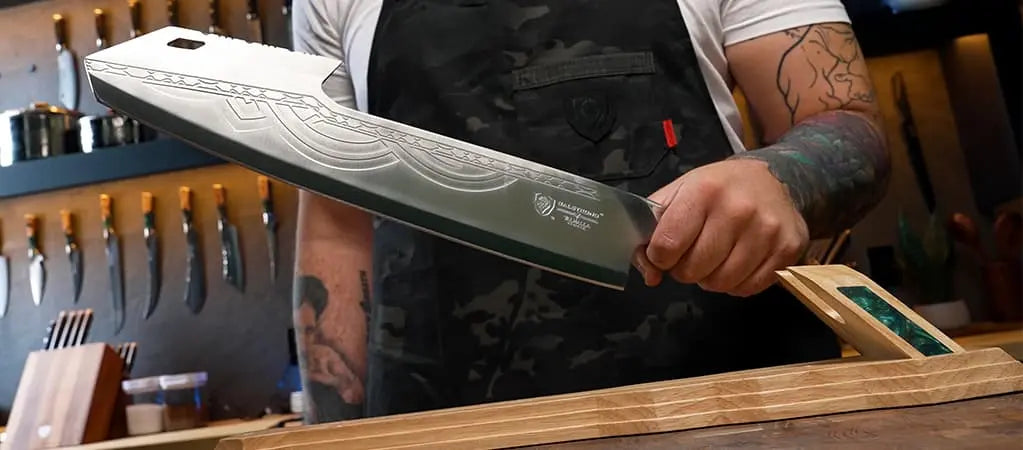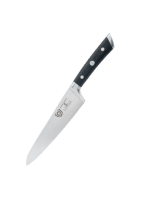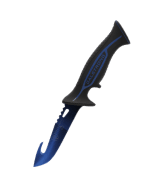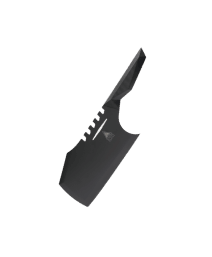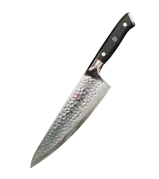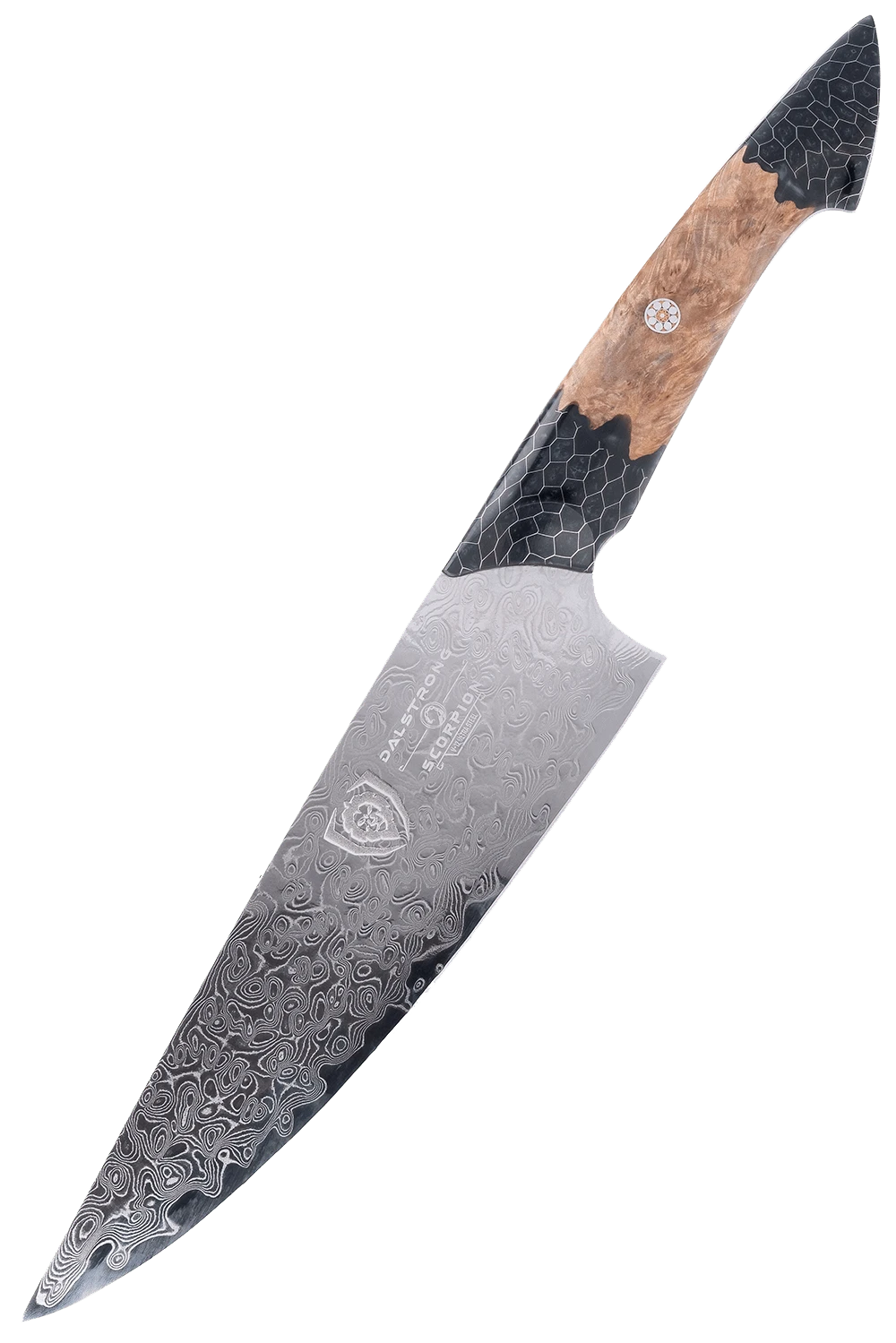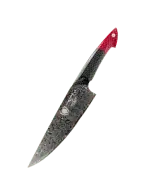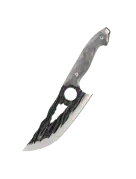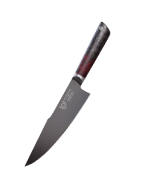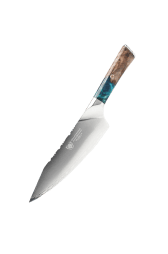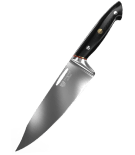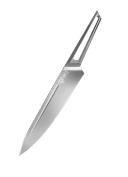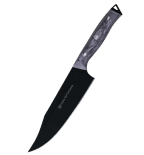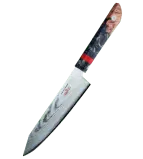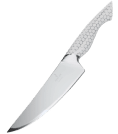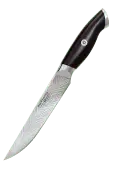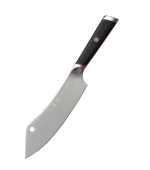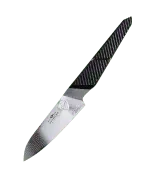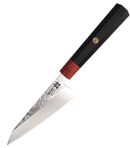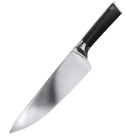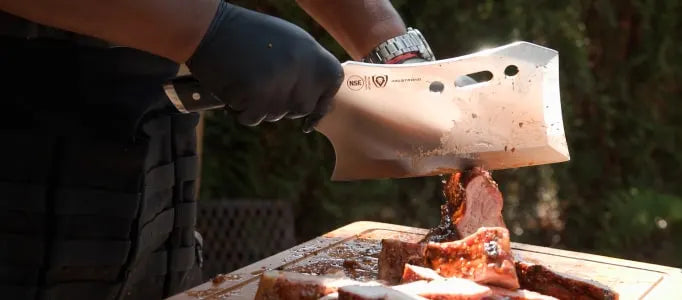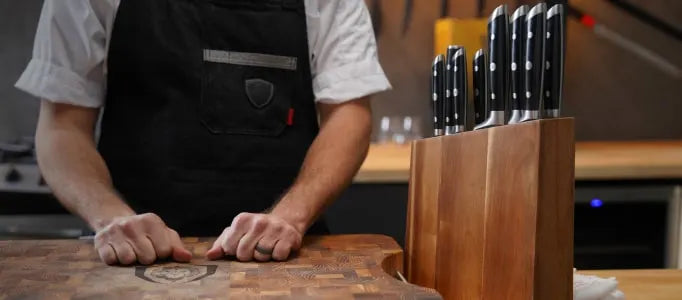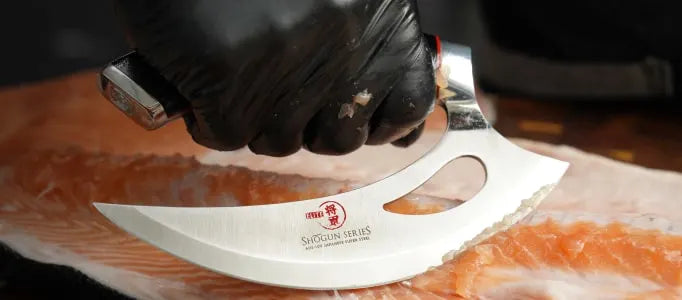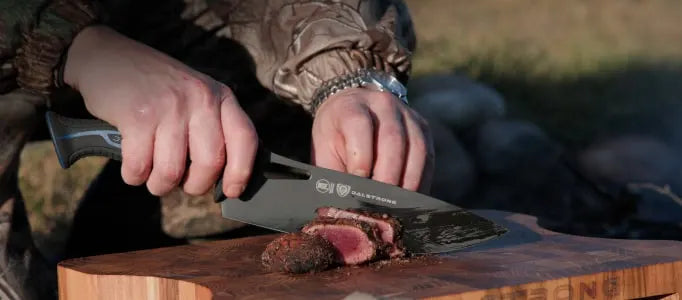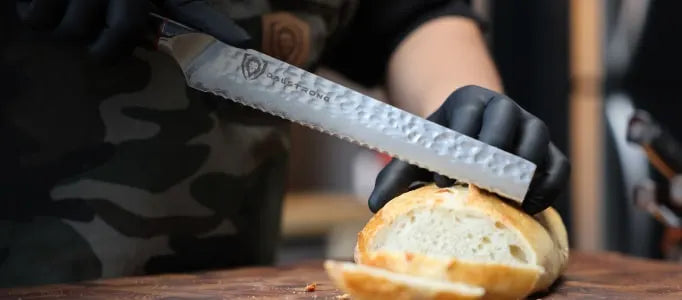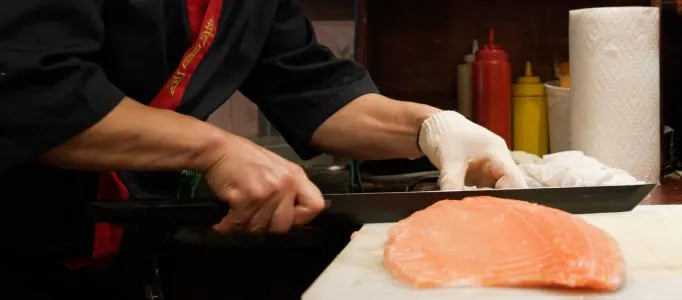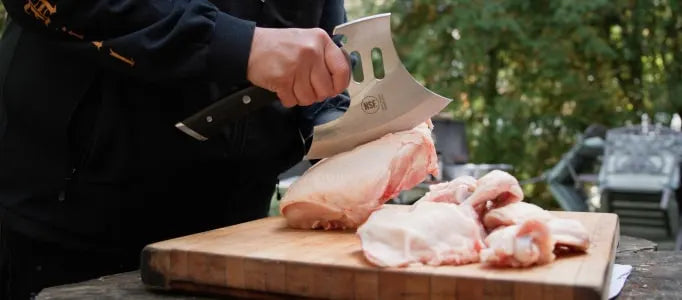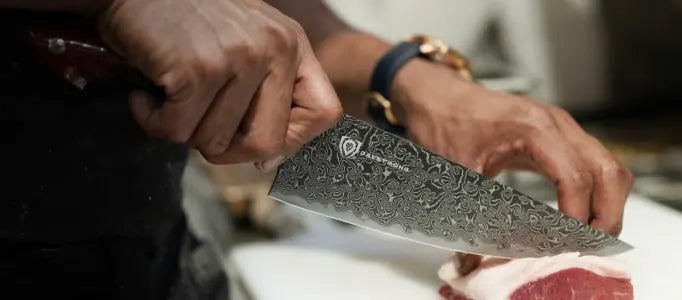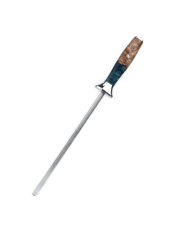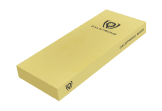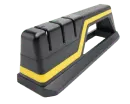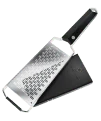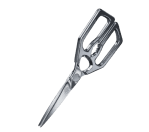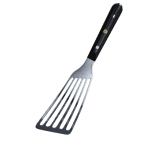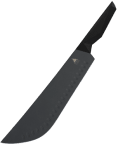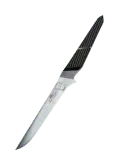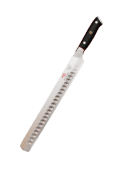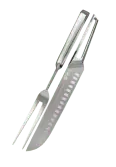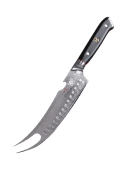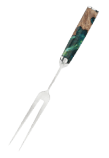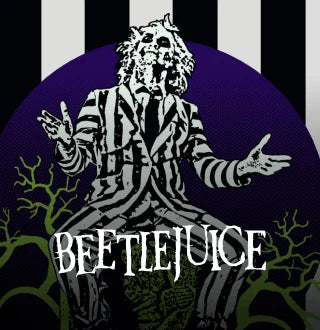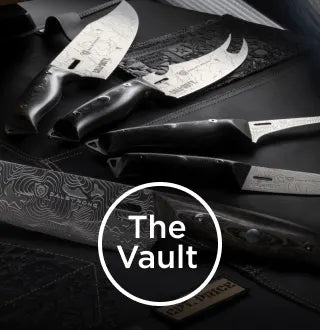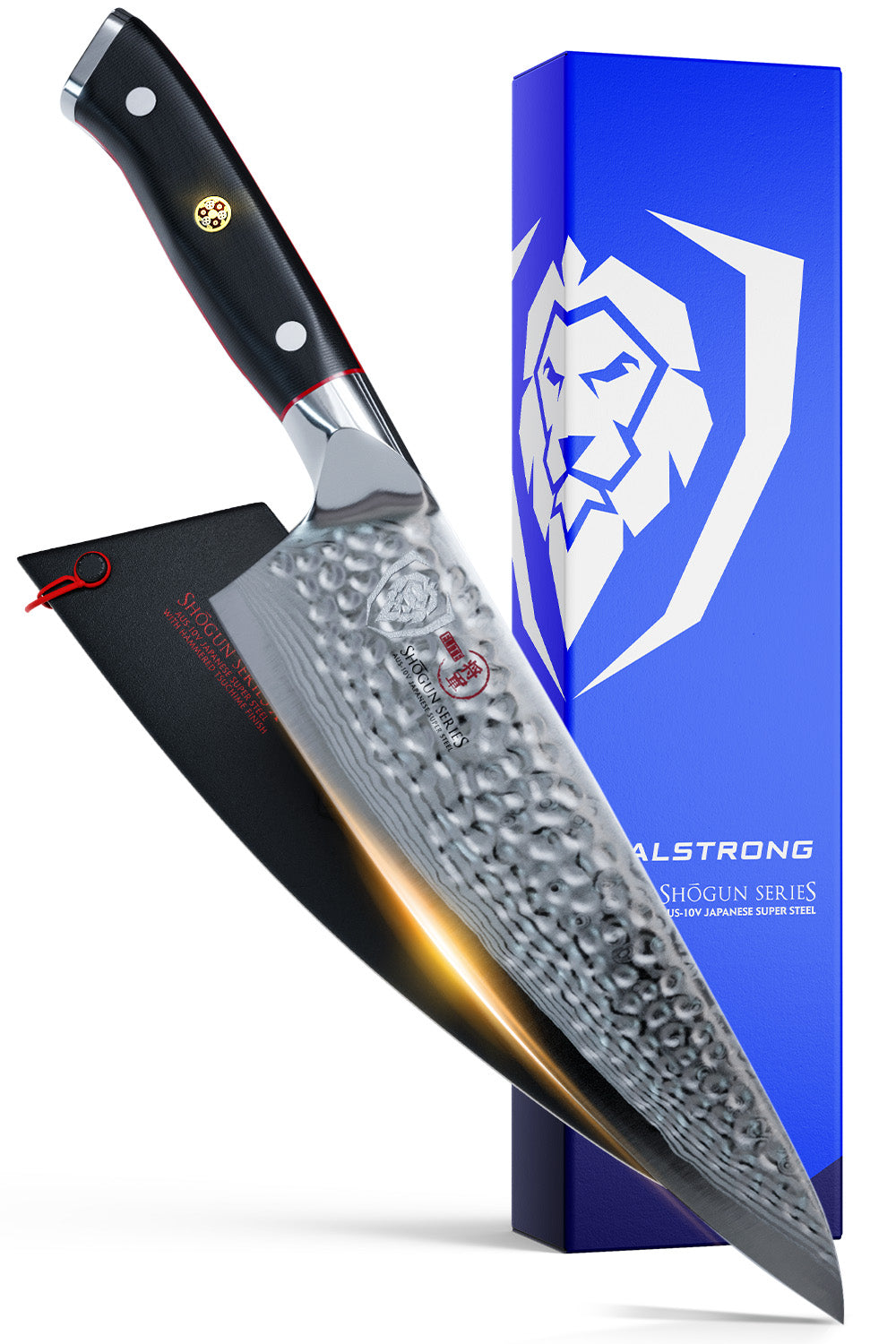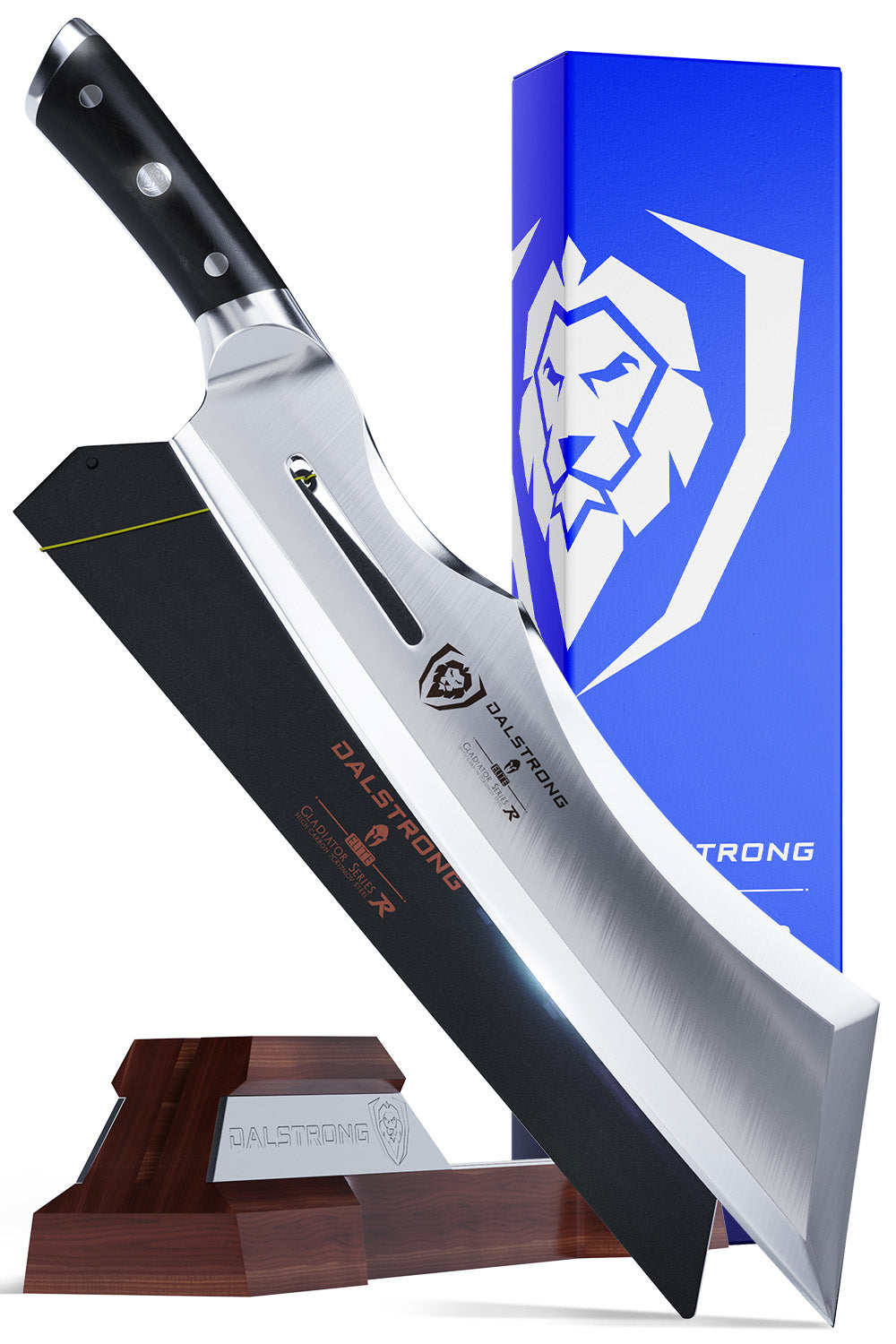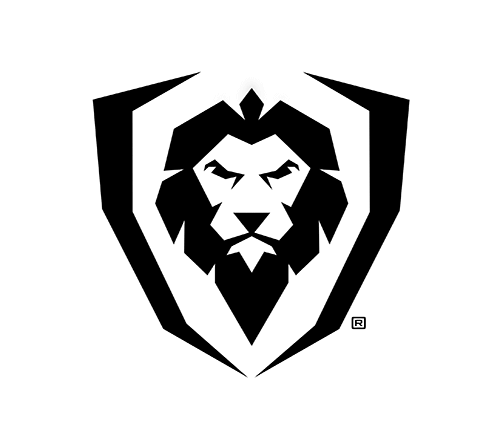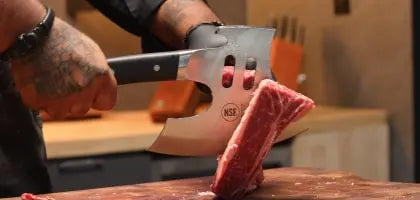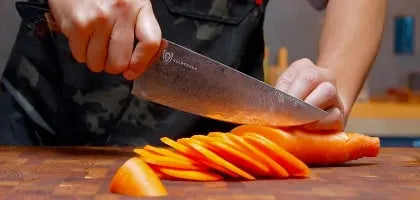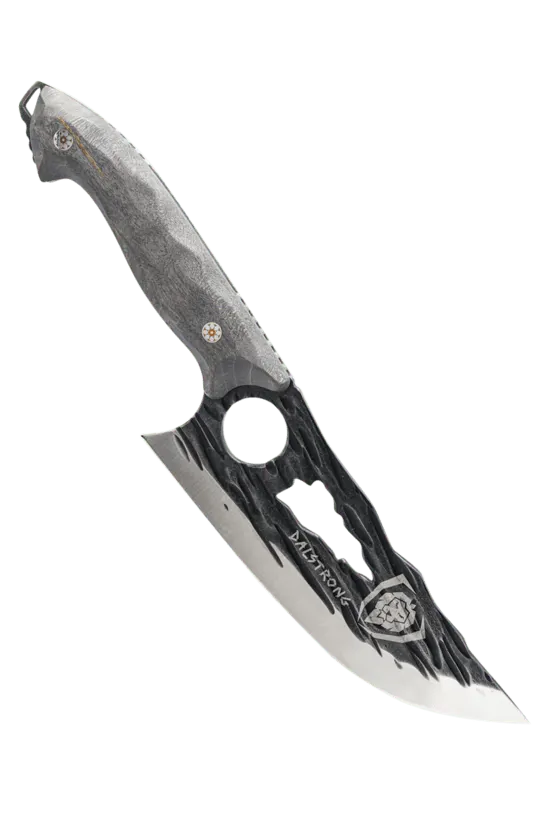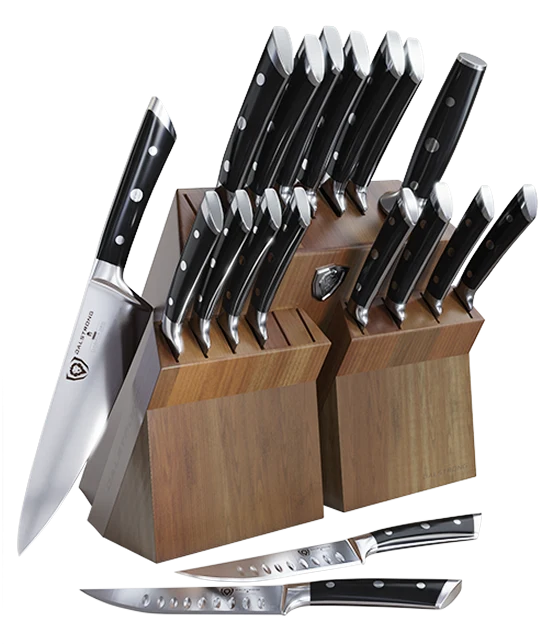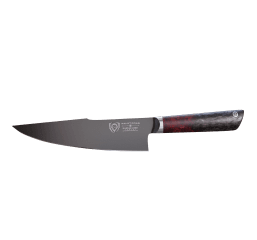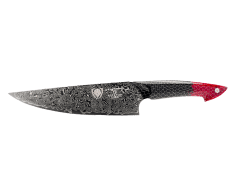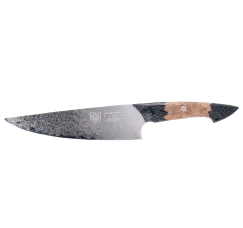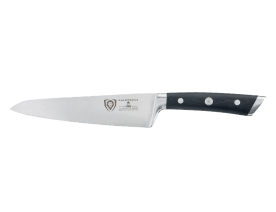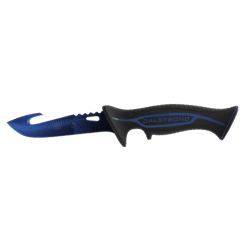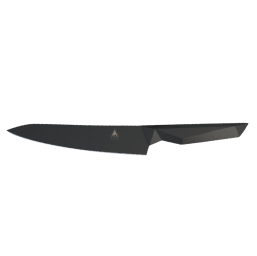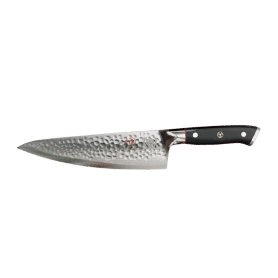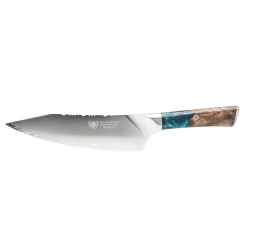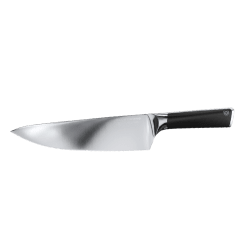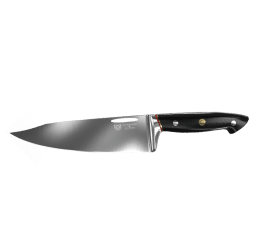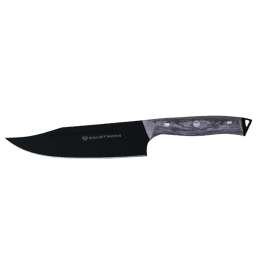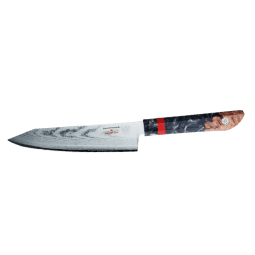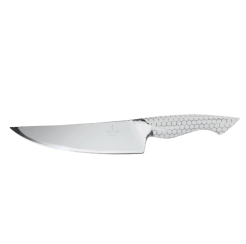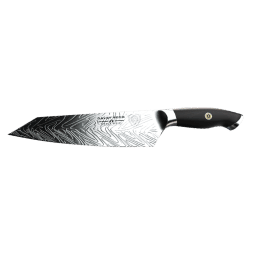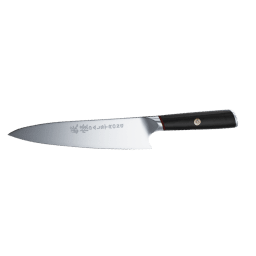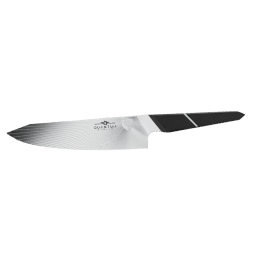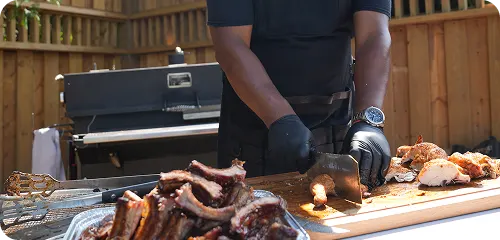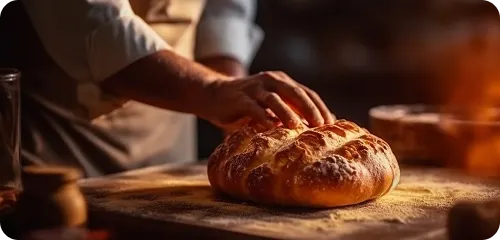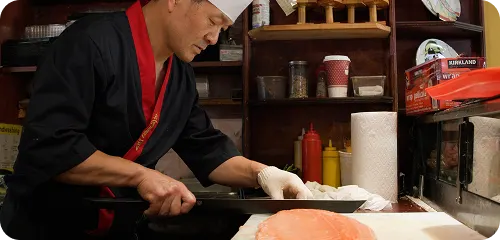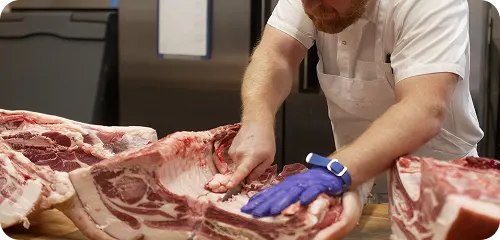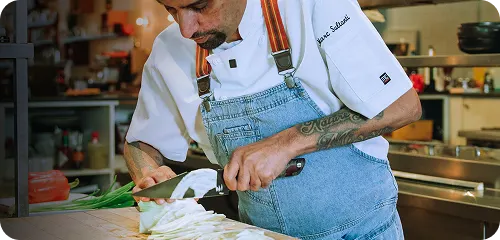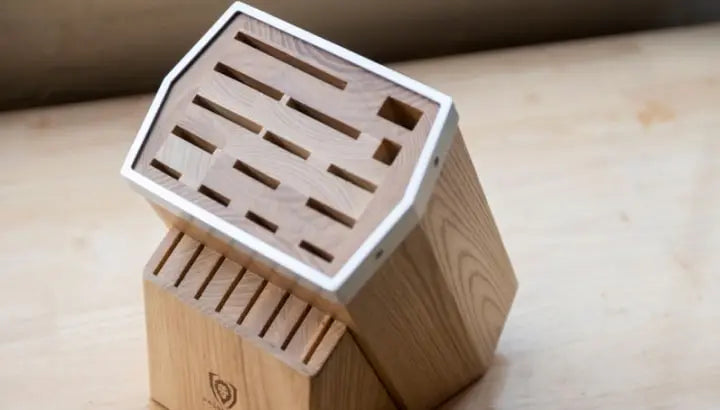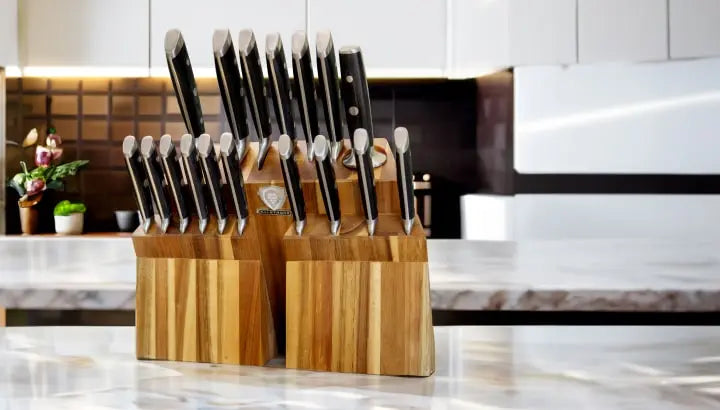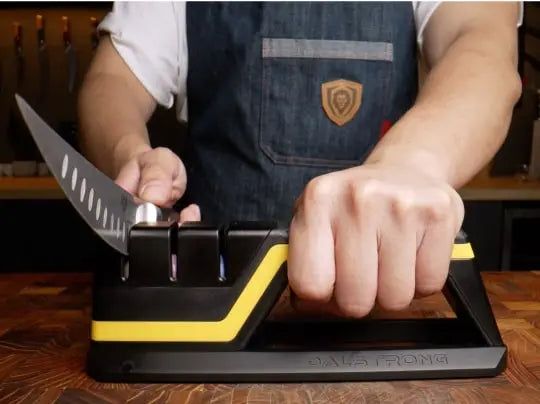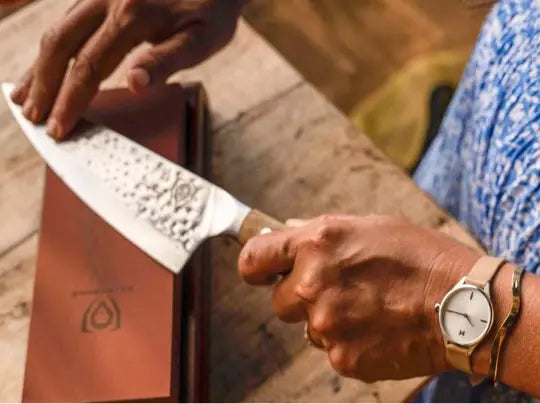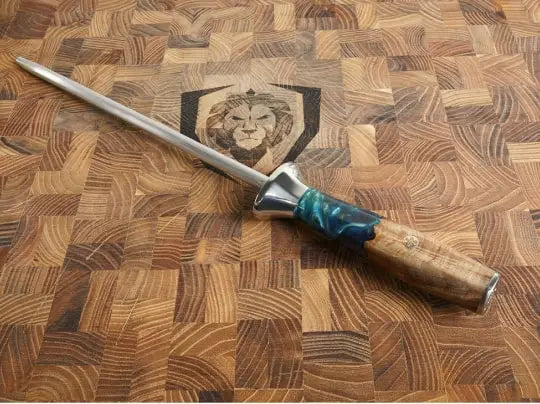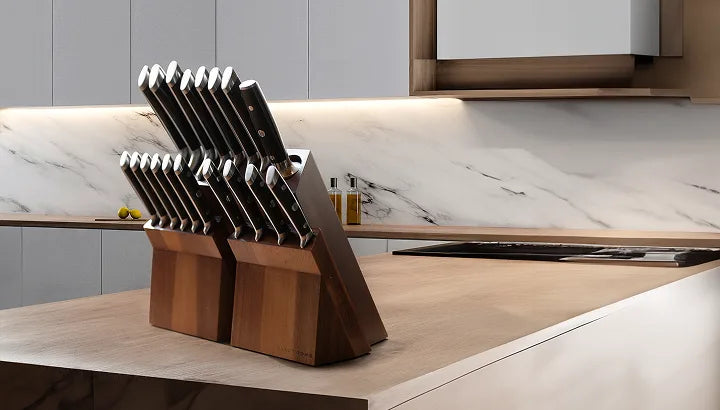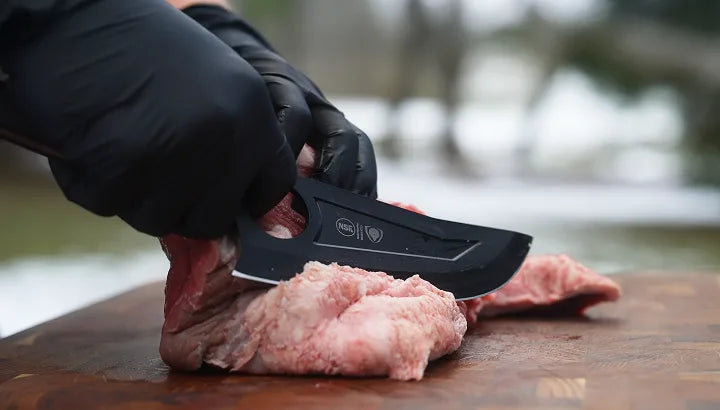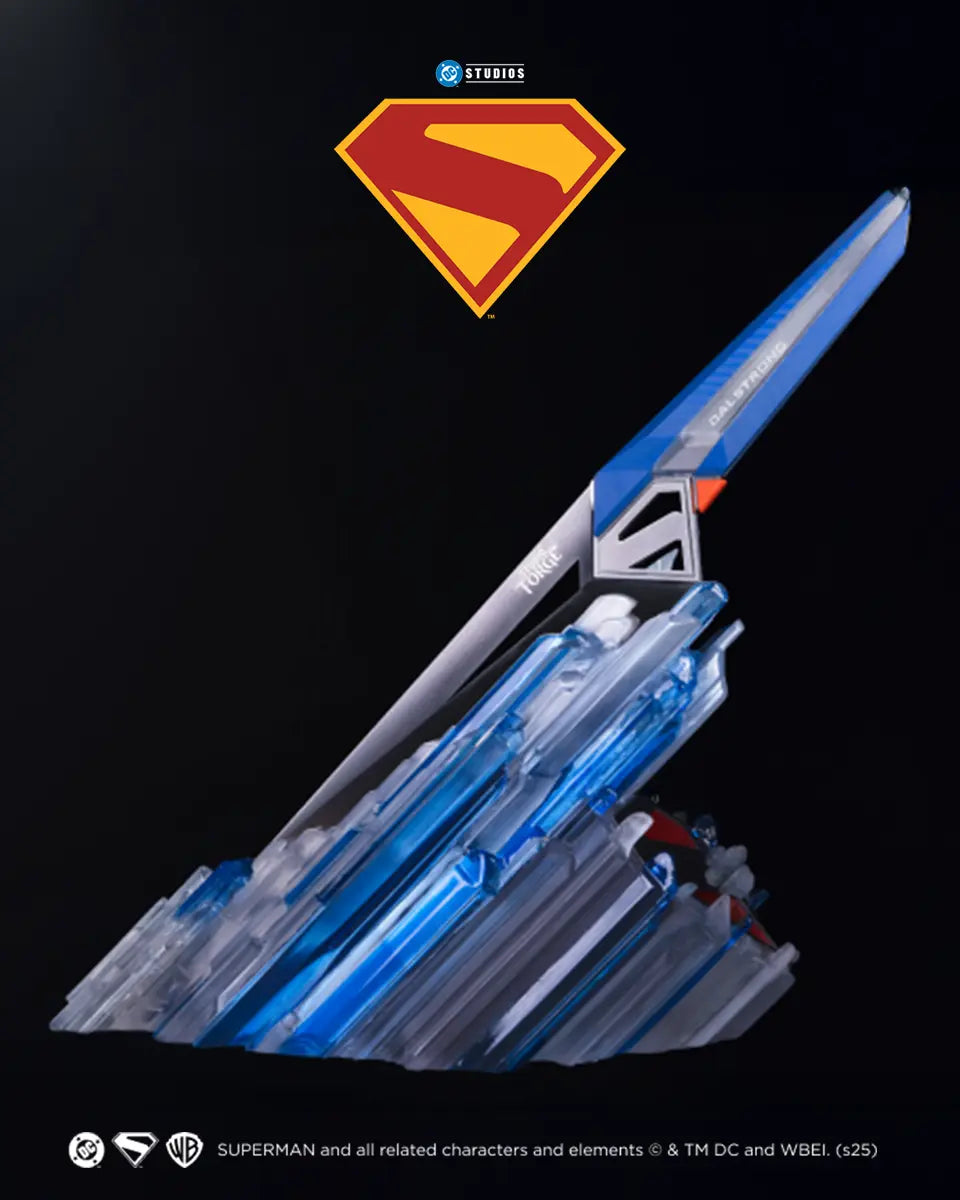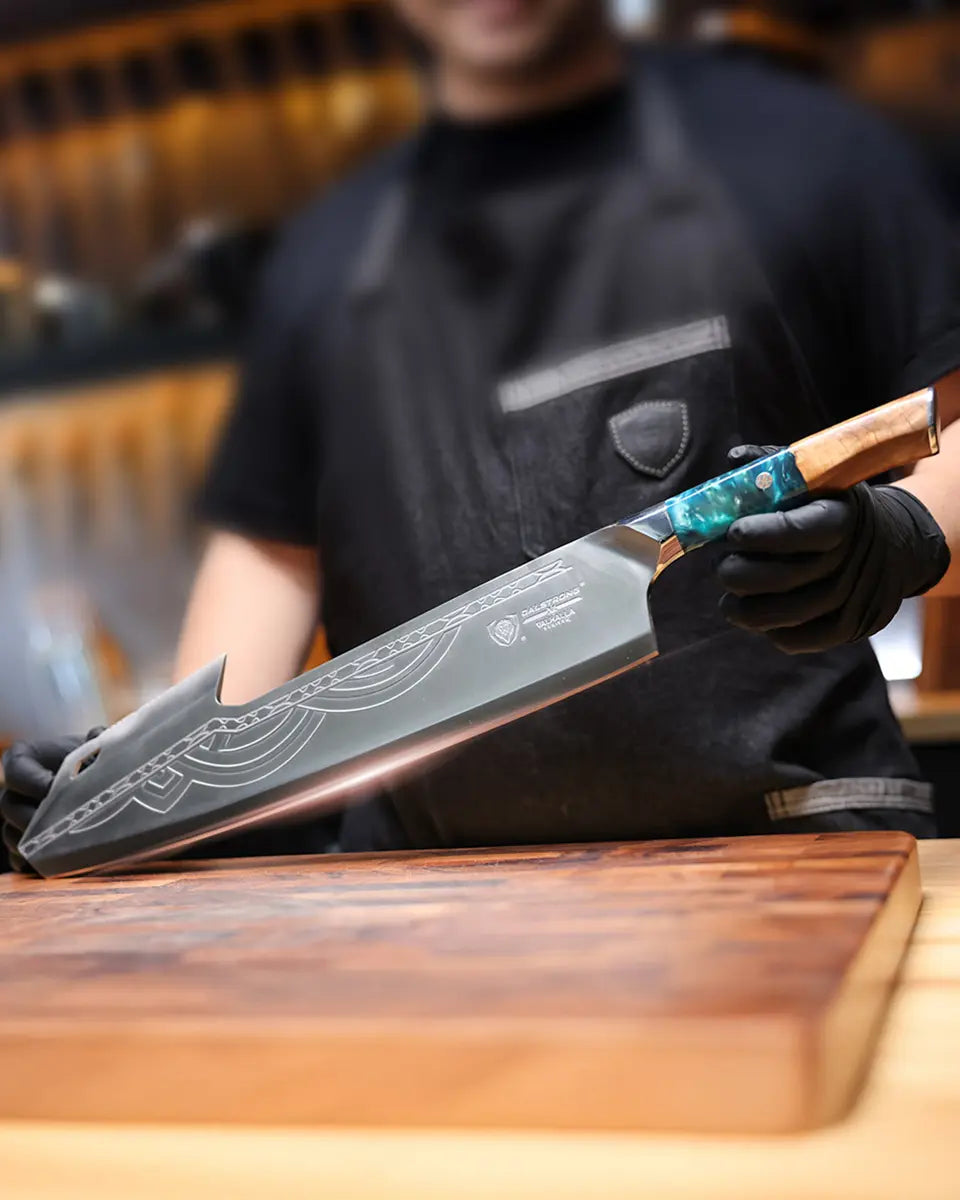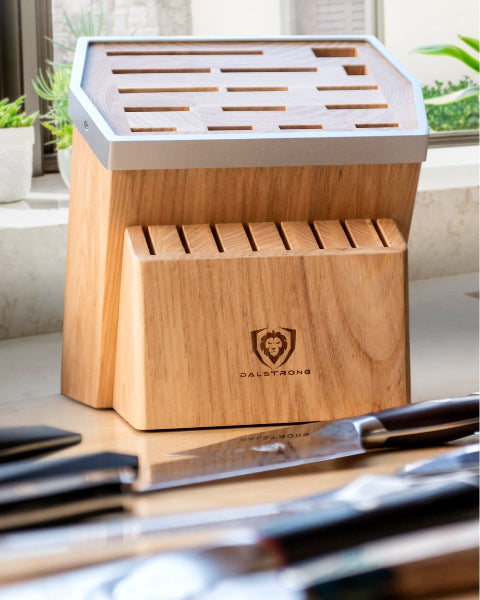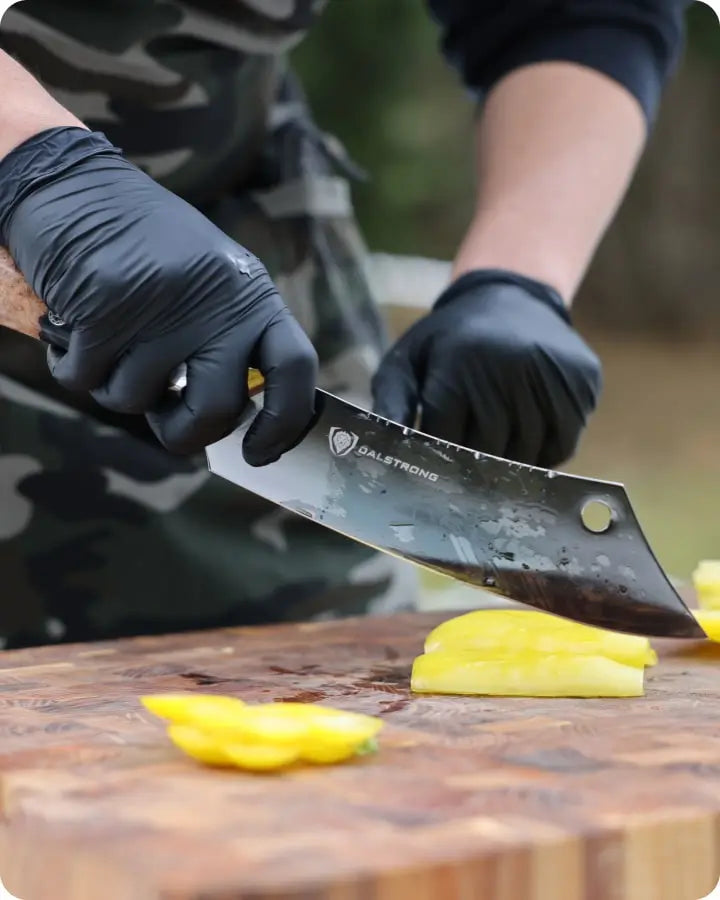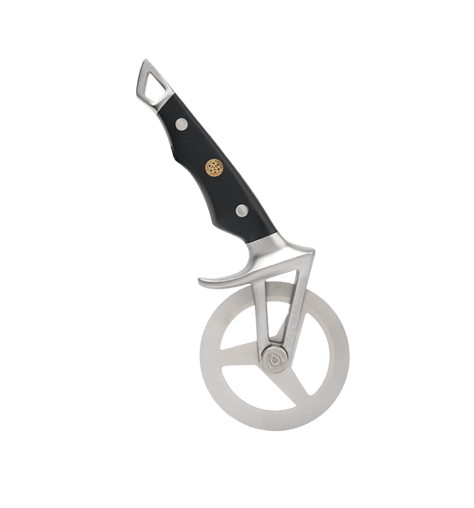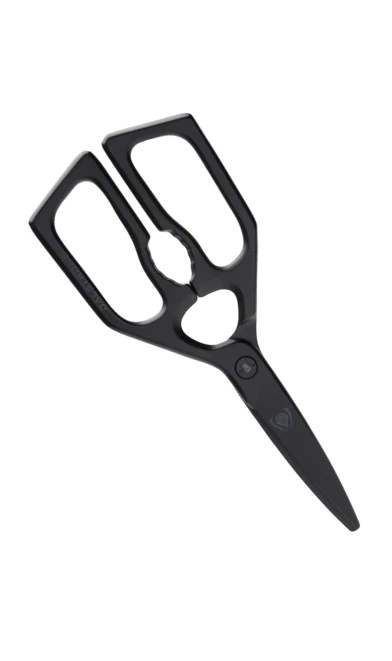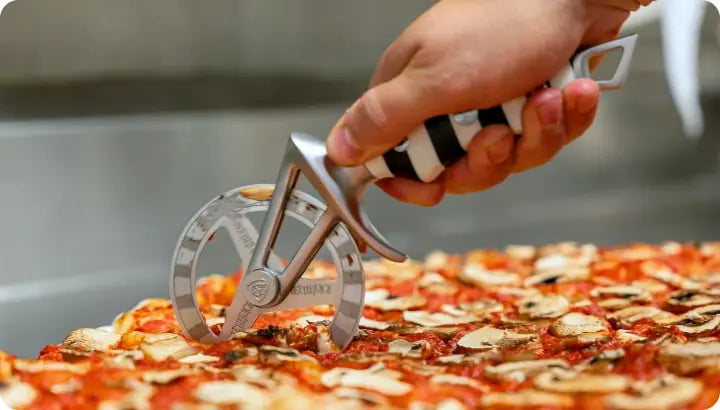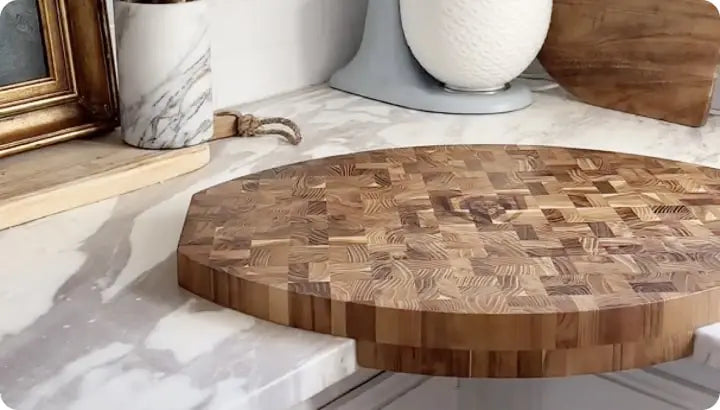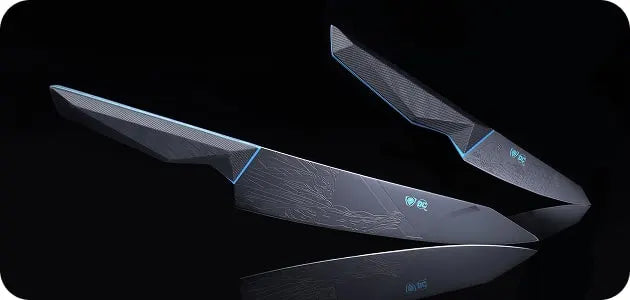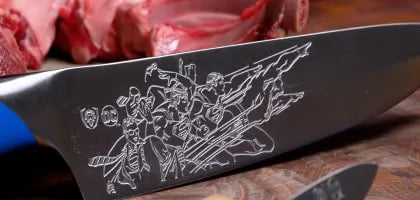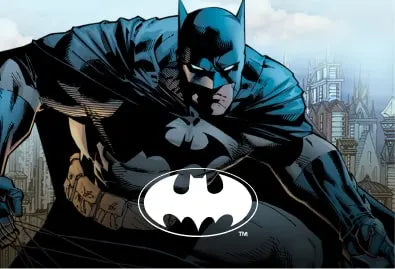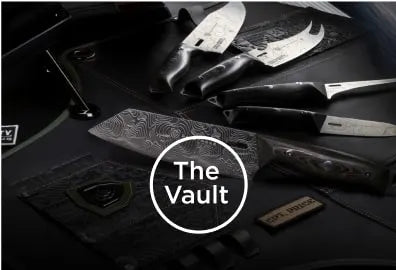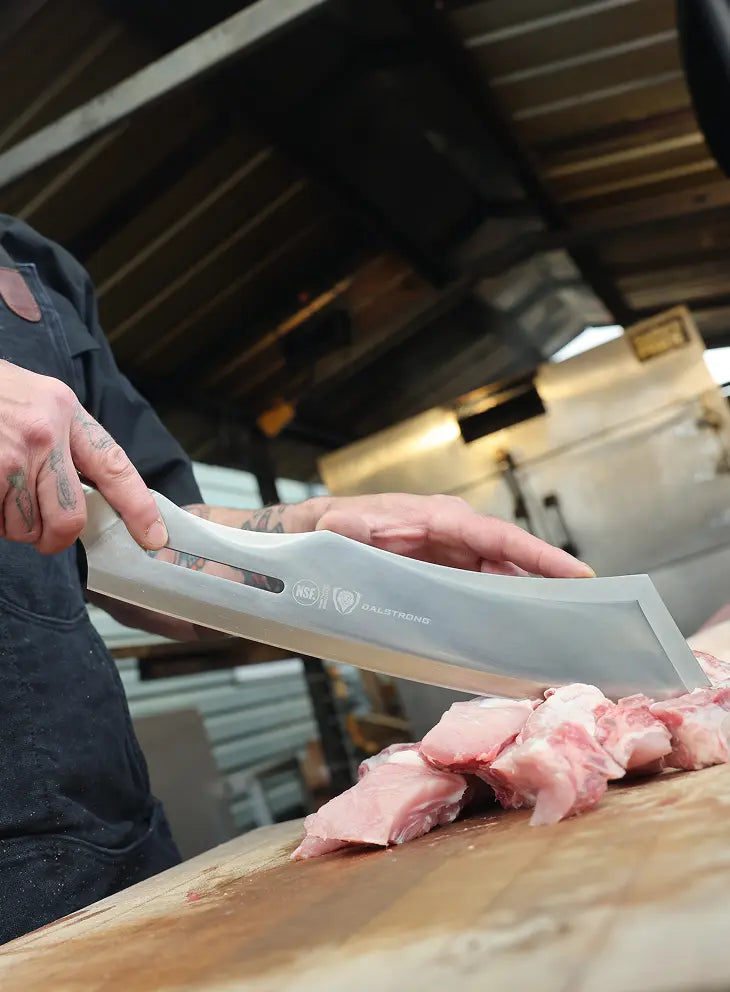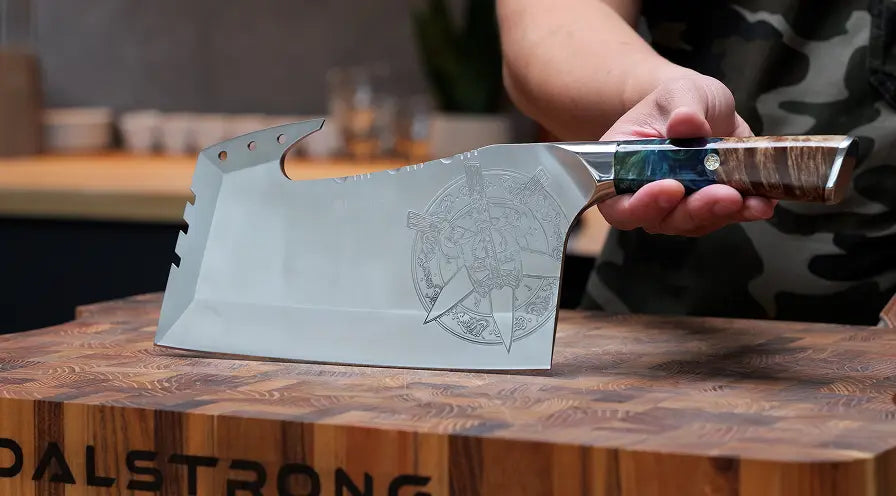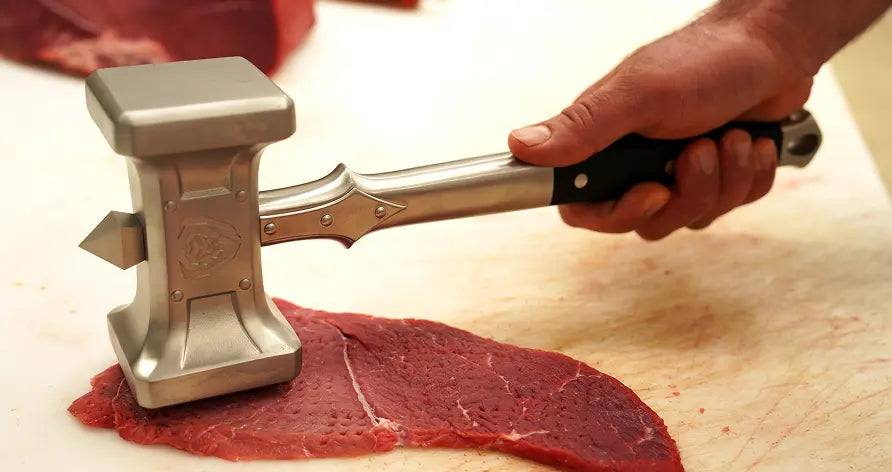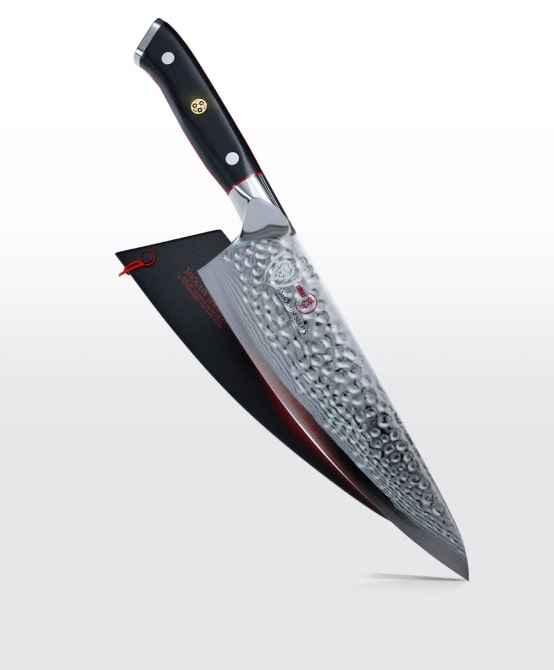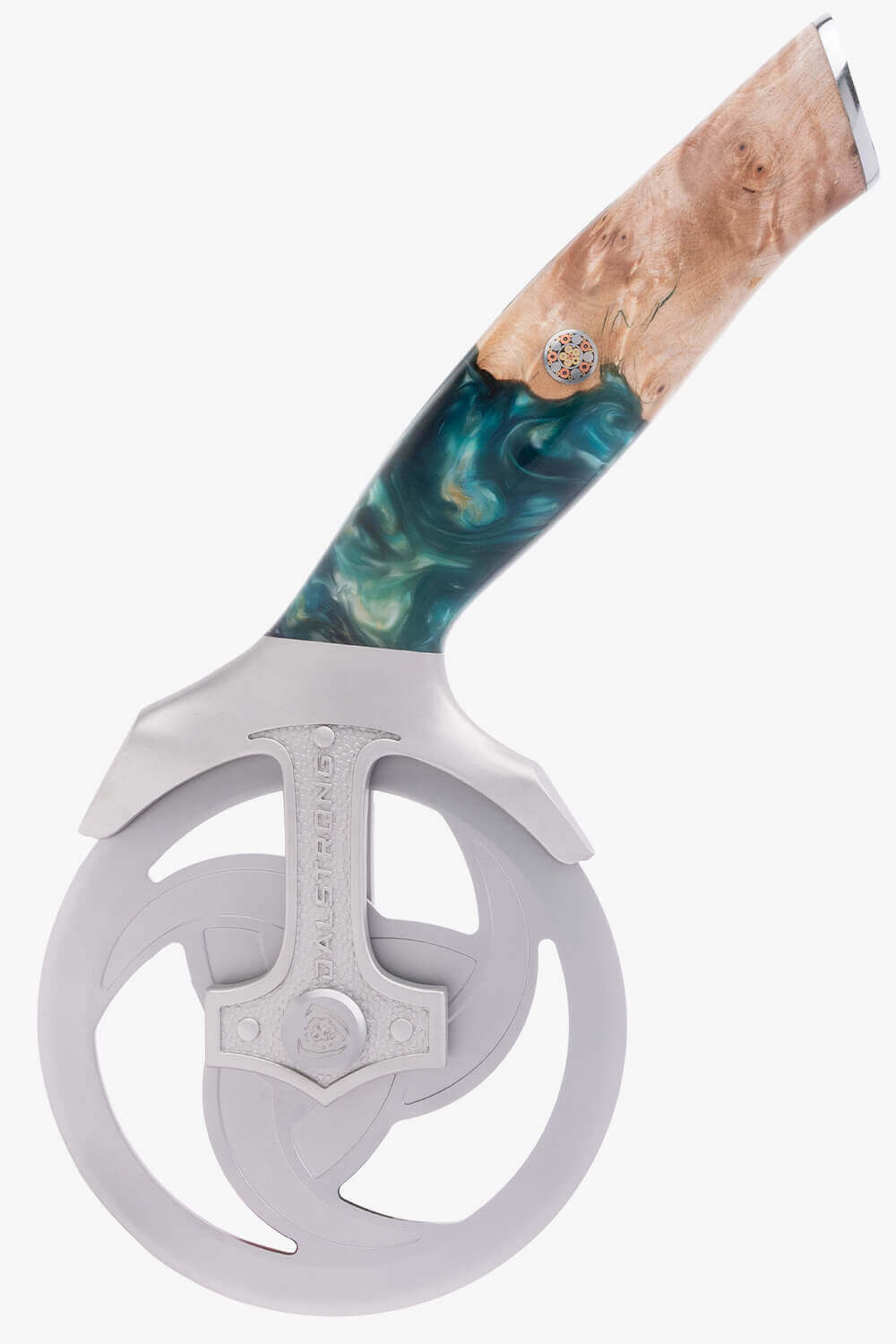Valhalla Series Slicing & Carving Knife 12"
Our favorite steak knife sets include:
- Gladiator Series 4-Piece Straight-Edge Steak Knife Set
- Shogun Series 4-Piece Steak Knife Set
- Shadow Black Series 4-Piece Steak Knife Set
1. Choosing The Right Steak Knife
 Night Shark Series Butcher Knife 10"
Night Shark Series Butcher Knife 10"
A good steak knife should glide through your steak with the same ease that a fish fork spears a delicate piece of sushi—effortlessly and with precision.
Read about does red meat have health benefits? A look at the science, here.
Handles
Let’s start with the handle, because this is where the knife meets your hand, and trust me, it matters more than you think. A wood handle offers that timeless, classic feel—think of it like your favorite pair of well-worn jeans. It’s got character, it’s comfortable, and it just feels right. But, like those jeans, it needs a bit of care. Wood handles require regular hand washing and drying, and an occasional oiling to keep them from drying out. Sure, it’s a bit more work, but it’s the kind of care that pays off in longevity.
On the other hand, if you’re more into modern minimalism, a black steak knife with a composite or stainless steel handle might be more your speed. These materials are more forgiving when it comes to maintenance—no special treatment needed, just a quick wash, and you’re good to go. They also have a sleek, contemporary look that can elevate your table setting to something that feels more like an upscale restaurant than a home-cooked meal.
And let's not forget about grip. Whether you’re slicing through a thick porterhouse or a tender filet, the last thing you want is a handle that slips or feels awkward in your hand. That’s where selecting cutlery with ergonomic design comes into play. A well-designed handle will fit comfortably in your hand, providing the perfect balance of control and ease.
Stainless steel handles, bring a more modern touch to the table. These handles are sleek, durable, and can withstand the wear and tear of frequent use. They’re the perfect match for a knife set with a gift box, making them not just a tool, but a statement piece. If you prefer a handle that’s low-maintenance and built to last, stainless steel might be your go-to choice. It’s the kind of material that fits right in with a black steak knife or even a full set of steel steak knives.
Blades
Now, onto the blade—because no matter how pretty the handle is, it’s the blade that does the heavy lifting. Steak knives typically come in two varieties: straight edge and serrated blades. The serrated steak knife is like the Swiss army knife of the steak world—it’s versatile, low-maintenance, and can handle just about any cut of meat you throw at it. The saw-like teeth grip and tear through tougher cuts with ease, making them ideal for those hearty, rustic steaks that require a bit more muscle to cut.
But if you’re a purist at heart, craving that clean, precise cut that keeps all those savory juices where they belong—inside your steak—then a fine edge steak knife set might be more your style. The smooth blade glides through the meat, offering a dining experience that’s as refined as it is delicious. Of course, these knives require regular maintenance with knife sharpeners to keep that edge razor-sharp, but for many, that’s a small price to pay for perfection.
Balance and Blade Length
Of course, blade length and balance are critical factors, too. A longer blade gives you more slicing power, but it can feel unwieldy if it’s not well-balanced. You don’t want to feel like you’re wielding a machete at the dinner table—unless that’s the vibe you’re going for, in which case, more power to you. Ideally, a steak knife should feel like an extension of your hand, allowing you to cut through your steak with precision and ease. It’s all about finding that Goldilocks zone where the knife is just right—not too long, not too short, not too heavy, and not too light.
Presentation Matters
Lastly, let’s talk about presentation—because we eat with our eyes first, right? If you’re the kind of person who loves a bit of elegance, consider investing in a 4-piece steak knife set or even an 8-piece steak knife set. Sets with gift boxes, like the classic steak knives from Wusthof or Laguiole en Aubrac, don’t just perform well—they look great doing it. Dalstrong's sets are especially renowned for their beautiful packaging.
Imagine this: you pull out your favorite steak knives, stored neatly in a black box within your knife block, and set them at the table alongside your best table knives and serving spoons. The guests’ eyes light up—because they know they’re in for something special. After all, steak knives set the tone for the meal, whether you’re slicing into a juicy ribeye or a delicate fillet. And when you invest in a set of high-quality steak knives, you’re not just buying a tool—you’re making a statement.
So, before you sit down to your next steak dinner, take a moment to think about the tools at your disposal. With the right steak knife in hand, you’ll be well on your way to not just eating your steak, but truly savoring it.
2. Understanding Steak Knife Construction
 Shogun Series BBQ Pitmaster & Meat Knife 8"
Shogun Series BBQ Pitmaster & Meat Knife 8"
Now that you’ve got a handle on choosing the right knife, let’s dive into what makes a steak knife tick. The anatomy of a steak knife is a little more complex than it appears—much like understanding the subtle differences between world cuisines. There’s a lot going on beneath the surface that turns a simple tool into something that can elevate your entire dining experience.
Blade Material
When it comes to steak knife blades, you’ve got your two heavyweights: carbon steel and stainless steel. Think of them as the seasoned veterans of the knife world, each bringing their own strengths to the table. Carbon steel is like that old-school butcher knife your granddad swore by—razor-sharp, sturdy, and oh-so-satisfying to use. This material offers a sharp blade that cuts through steak like butter (not that you should be cutting butter with your steak knife, but you get the idea). The downside? Carbon steel needs a bit of TLC. It’s prone to rust if you don’t keep it dry, so you’ll need to make sure it’s clean and well-oiled after each use.
On the other side, stainless steel steak knives are the go-to for those who value convenience as much as performance. Stainless steel is more forgiving; it offers durability without demanding too much in return. A stainless steel blade is like that reliable friend who always shows up on time and never forgets your birthday—dependable and low maintenance. Whether you’re slicing into a medium-rare ribeye or a wood steak, these knives get the job done with minimal fuss.
But here’s where things get interesting: not all stainless steel is created equal. High-quality stainless steel steak knives, like those with stainless steel blades from Victorinox Swiss, offer a fine edge that stays sharper for longer, especially when paired with proper maintenance. This is where those knife sharpeners come into play. Regular sharpening keeps your knives in prime condition, ensuring they cut through your steak with ease every time.
Full Tang vs. Partial Tang
Speaking of tangs, let’s get into the nitty-gritty of knife anatomy. The tang is the part of the blade that extends into the handle, and it’s a critical component in determining the knife’s balance and durability. Full tang knives are like the steel skeletons of the knife world—the blade runs all the way through the handle, offering superior strength and stability. You’ll often find this in forged steak knives, which are crafted with care and precision.
A full tang knife is less likely to break or bend, making it a reliable choice for serious steak enthusiasts. Whether you’re carving a prime rib with a carving knife or simply enjoying your favorite steak knives, the full tang construction ensures that your knife can handle whatever you throw at it. Knives from Dalstrong, Messermeister Avanta or Pro Le Blanc are often built with this kind of robust design, ensuring longevity and performance.
Blade Edge: Smooth vs. Serrated
Finally, let’s talk about the blade edge. This is where personal preference really comes into play, and it’s all about how you like to cut your steak.
A smooth edge, or fine edge, is ideal for those who want a clean, precise cut. It’s the kind of blade that glides through your steak like a hot knife through butter, preserving the meat’s juices and texture. However, this kind of edge requires regular maintenance. You’ll need to keep your knife sharpeners handy to maintain that razor-sharp performance. It’s a bit of extra work, but for many, the payoff is worth it.
On the other hand, a serrated edge is a bit more rugged. It’s like the utility knife of steak knives—perfect for cutting through tougher cuts without losing its edge. Serrated steak knives are also lower maintenance, as they don’t require sharpening as often. If you’re the type who enjoys a bit of texture and likes to feel the blade “bite” into the meat, a serrated edge might be your best bet. Plus, it’s great for those who appreciate the simplicity of a blade that can handle whatever you throw at it, whether it’s a steak, a vegetable, or even a slice of rustic bread.
3. Investing in Quality: Durability And Longevity
 Shogun Series Butcher & Breaking Knife 8"
Shogun Series Butcher & Breaking Knife 8"
Investing in a quality set of steak knives is like choosing a lifelong companion for your culinary adventures. It’s not just about having a tool that works; it’s about having one that enhances every steak dinner, making each bite as satisfying as the last.
Maintenance Tips
First and foremost, let’s talk about washing. It’s tempting—oh so tempting—to just toss those steak knives in with the rest of your stainless steel cookware and call it a day. But resist that urge! Hand washing is your best bet for preserving the integrity of both the blade and the handle.
Dishwashers can be harsh, leading to dulling blades and damaged handles over time. A quick hand wash with warm, soapy water and a soft cloth is all it takes to keep your knives in tip-top shape. And if you’ve got wood handles, like those on olivewood steak knives, drying them thoroughly is a must to prevent any warping or cracking. A little extra care here goes a long way in maintaining the beauty and functionality of your knives.
Now, onto storage. Proper storage is essential for keeping your steak knives sharp and ready for action. A knife block is a classic choice, offering both protection and easy access. It’s like a cozy home for your knives, keeping them safe from nicks and scratches. But if you’re short on counter space, a magnetic strip or a dedicated knife storage drawer can be just as effective. Just make sure your knives aren’t rattling around in a drawer with other utensils—that’s a surefire way to dull those blades quickly.
For those who love a touch of elegance, a knife block with a built-in steak knife set is a stylish solution that keeps your knives organized and within arm’s reach.
With proper care, a good set of steak knives can last decades, turning every steak dinner into a memorable event. Quality steak knives also hold their value over time. Unlike cheaper knives that need to be replaced every few years (if not sooner), a well-made set will continue to perform beautifully, maintaining their sharpness and aesthetic appeal.
Whether it’s the smooth edge of a fine blade or the ergonomic handle that feels like an extension of your hand, these knives are built to last, making every penny spent well worth it.
4. Recommended Dalstrong Steak Knives
1. Gladiator Series 4-Piece Straight-Edge Steak Knife Set
If you're looking for steak knives that get the job done without breaking a sweat, the Dalstrong Gladiator Series 5” straight-edge set might be just what you need. These knives are perfect for anything from a juicy rib-eye to a delicate chicken cordon bleu.
PROS:
- The high-carbon German steel blades are durable and stay sharp, so you won’t have to worry about constant sharpening.
- The handles are super comfortable, made from a tough material that feels good in your hand even during long meals.
- These knives are built to last with full-tang, triple-riveted construction that keeps them sturdy.
- They’re low-maintenance, with added stain resistance and a special treatment to keep them looking and working great.
CONS:
- They might be a bit on the heavier side if you prefer lighter knives.
- The modern look might not be everyone’s style, especially if you’re into more traditional designs.
2. Shogun Series 4-Piece Steak Knife Set
If you’re serious about your steak dinners, the Dalstrong Shogun Series 5” steak knives are the real deal.
PROS:
- The blades are made from AUS10V Japanese Super Steel, which means they’re incredibly sharp and stay that way for a long time.
- The hammered Tsuchime finish not only looks cool but also helps prevent food from sticking to the blade.
- The handles are built from military-spec G10 fiberglass, so they’re durable and feel solid in your hand.
- These knives come with an engraved stainless steel end cap and a full-tang, triple-riveted build, giving them a balanced feel and extra strength.
CONS:
- They are towards the top of the price range represented in this list today.
- The intricate design and Damascus layering might be a bit flashy if you’re more into simple, understated tools.
3. Shadow Black Series 4-Piece Steak Knife Set
If you're ready to bring a little edge to your dining experience, the Dalstrong Shadow Black Series steak knife set might just be what you’re looking for. Razor-sharp and with a striking black design, these knives will glide through your steak like a hot knife through butter.
PROS:
- The black titanium-nitride coating not only looks sleek but also adds extra toughness and corrosion resistance, setting these knives apart from more traditional designs like the Shogun or Gladiator series.
- The ultra-sharp, high-carbon steel blades are hand-sharpened to perfection, giving you precision with every cut while still maintaining resilience.
- The ergonomic G10 handle is nearly impervious to heat, cold, and moisture, ensuring a comfortable grip no matter how long your meal prep takes.
- Unlike the Shogun or Gladiator sets, the Shadow Black Series includes a BPA-free sheath for each knife, offering additional protection and making them easy to store safely.
CONS:
- The bold, black design might not appeal to those who prefer a more classic or traditional look in their cutlery.
- The non-reflective titanium-nitride coating, while durable, might require a bit more care to maintain its sleek appearance compared to a more standard stainless steel finish.
5. Frequently Added Questions
What knives are used for steak?
Steak knives are designed with either a straight or serrated blade to easily cut through cooked meat. They often come in sets, like a 4-piece steak knife set or even an 8-piece steak knife set, depending on your dining needs.
Which knife for steak?
The best knife for steak is one that feels comfortable in your hand and slices through your steak cleanly. If you prefer a smooth cut, go for a fine edge steak knife set. If you like a bit more grip when cutting, a serrated steak knife is your go-to.
Is steak knife a cutlery?
A steak knife is a part of your cutlery collection. It’s a specialized table knife designed specifically for cutting steak and other cooked meats. It’s the star of your cutlery set when it comes to steak dinners.
What is a steak knife used to cut?
A steak knife is primarily used to cut cooked meats, particularly steak. However, they can also come in handy for slicing through other hearty dishes. Just don’t try using them to cut bread or spread butter—leave that to the butter spreader and bread knives.


